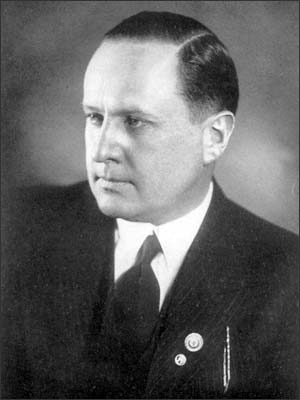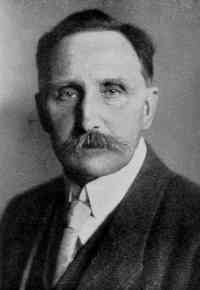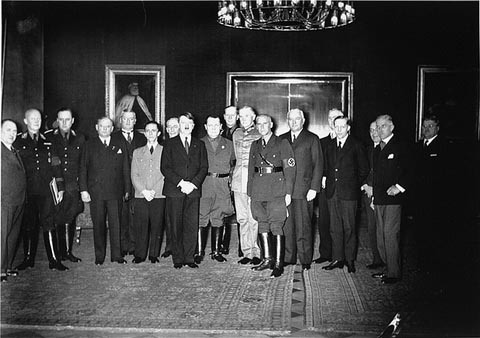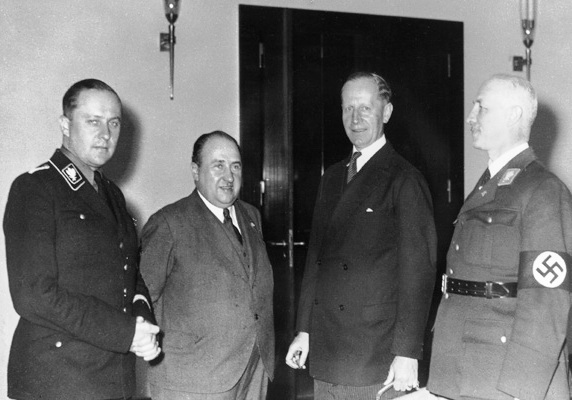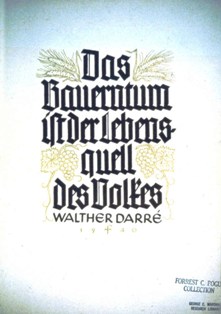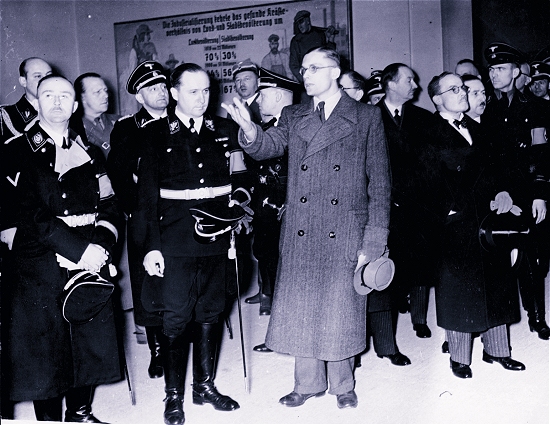Holocaust Education & Archive Research Team |
|
Holocaust Economics
| |||||
R. Walther Darré Reich Minister for Nutrition and Agriculture and the Myth of Blut & Boden
"Ricardo" Walther Darré was born in Argentina on 14 July 1895 in a Buenos Aires neighbourhood known as Belgrano. His father was German and his mother a mix of German & Swedish descent.
His parents sent him back to Germany at age nine, to attend school in Heidelberg; in 1911 he was sent as an exchange pupil to King's College School in Wimbledon. The rest of the family returned to Germany in 1912.
As a young man in Germany, Darré initially joined the Artamans, a Volkish youth group who were committed to returning to the land. It was here that Darré was exposed to the teachings of Karl Haushofer, a founder of "geopolitics" and one of the leaders of the Artaman group.
Haushofer proposed some of the original philosophies which gave birth to the German policy of "Lebensraum" and the theory of Blut und Boden" or "Blood and Soil". The essence of this theory was the mutual and long-term relationship between a people and the land that it occupies and cultivates.
Nazi propaganda drew heavily on these types of rural mysticism, and the concept of 'blood and soil' that arose in reaction to the rapid industrialisation and urbanisation in Germany from the late nineteenth century onward. It was especially popular among farming groups disadvantaged by the industrial expansion.
The Traditional rural virtues of loyalty, morality and racial purity were to guarantee a stable, hierarchical community in which all knew their place. As well, the idealised 'peasant nobility' would serve as an antidote to the cosmopolitan, sophisticated, urban, Jewish, intellectuals.
In 1933 Germany had an estimated six million unemployed. Like his contemporaries in the capitals and governments of the world-and like so many politicians today, Hitler had little interest in economics and, in fact, was totally ignorant of economic theory.
It was simply understood that although economic centralization would have to wait until political opponents and organized opposition were suppressed or liquidated, the Nazis' "new deal" would begin almost immediately. For instance, in October 1933, Hitler declared that "the ruin of the German peasant will be the ruin of the German people." New farm programs were instated, along with propaganda about Blut und Bloden.
Walther Darré, who in 1929 published a book, The Peasantry as the Life Source of the Nordic Race, felt that the Jews were excluded from the concept of Blut und Boden and in his writings, Jews were referred to nothing more than 'weeds'.
Since the Jews were without land, they were viewed as nomads and wanderers, even if they had legal, valid citizenship, and long family and business ties in an area. Since the Jews were dispersed for centuries in all lands, they were not tied to the land, which the Nazis required in concept for a stable national people.
It was similar reasoning to earlier historical reasoning's which saw certain European governments forbidding Jews to live in certain areas or enter certain professions for fear that they would stabilize and prosper. While Jews built up the nations they lived in, often in politics, the arts, banking and economics, etc, they were historically a perennial problem in the dialogue between needing their influence and ability and severe anti-Semitism.
To accomplish this, Darré issued the Hereditary Farm Law in 1933, which had the purpose of preventing foreclosure on or the sale of farmland-at the expense of the peasant farmers` liberty. This "law" established that only Aryan Germans who could prove the purity of their bloodline back to 1800 could own a farm.
This law was soon followed by the establishment of the Reich Food Estate which was designed to regulate the conditions and production of the farmers. Its vast bureaucracy enforced regulations that touched all areas of the farmer's life and his food production, processing, and marketing. The Reich Food Estate had two goals: to jack up agricultural prices, and to make Germany "self-sufficient in food."
Darré arbitrarily fixed the prices of agricultural products: within the first two years of the regime, wholesale prices rose 20 percent, and for cattle, vegetables, and dairy products, the rise was even steeper. But the farming sector was not exempt; the additional costs of these artificial prices were passed on to all consumers.
For its first year, the regime concentrated on a program of government grants of loan credit; stimulus bills for public works, such as road-building and forestation; and it "targeted tax cuts" to enterprises that increased capital expenditure and increased their number of employees.
But from 1934 onward, the implementation of the Wehrwirtschaft, or war economy, became the model to which business and labour were subordinated and which was designed to function, not just in time of war, but in the period before war began.
Darré then took over the SS Race and Resettlement Office where he developed a plan for "Rasse und Raum" "race and space", or territory, which provided the ideological background for the Nazi expansive policy "Lebensraum" "Living space" theory proselytized by Hitler in Mein Kampf.
Darré strongly influenced SS-Reichsführer Heinrich Himmler in his goal to create a German racial aristocracy based on selective breeding. The Nazi policies of eugenics would lead to the annihilation of millions of non-Germans.
Darré's reforms however, were largely ineffective. They failed to increase the rural birth-rate, or to stop the transformation of the peasant into a capitalist farmer. Urbanisation grew at a greater rate than before. Farm incomes could not keep pace with national income. Historians estimate that more than a million Germans moved from farms to cities between 1933 to 1939.
Darré's writings have proven fairly influential on those modern-day right-wing extremists who also believe in the decadence of urban life and the nobility of self-sufficiency.
His two main writings were Das Bauerntum als Lebensquell der nordischen Rasse (1928) and Neuadel aus Blut und Boden (1934), translated into English as "The Peasantry as Life Source of the Nordic Race" and "A New Nobility of Blood and Soil" respectively.
Darré is also believed to have delivered an infamous speech as reported in Life Magazine:
During WW2 pragmatic and military considerations assumed greater importance and it was Himmler who was given the power of decision over agricultural settlements in occupied territories. Darre's opposition to the concept of "defense farms" his increasingly marginal status as a "theoretician" and above all his failure to organize the German food supply efficiently, led to him falling out of favour with Himmler, and he resigned in May 1942, for reasons of health. But is is believed his career with the Nazi party came to an end as as the result of disputing an order from Hitler to reduce rations in the labour camps . He was arrested in 1945 and tried at the subsequent Nuremberg Trials (specifically, the Ministries Trial, 1947-49).
He was acquitted on many of the more serious charges against him, specifically those relating to genocide; however he was eventually sentenced to five years in prison by an American Military Tribunal at Nuremberg for the confiscation of property from Polish and Jewish farmers and for having ordered German Jews to be deprived of basic foodstuffs, thus causing starvation.
He was released in 1950 and died in Munich on 5 September, 1953 of cancer of the liver, induced by alcoholism.
Sources: R. Walther Darré Und Die Nationalsozialistische Bauernpolitik in Den Jahren 1930 bis 1933
Copyright Carmelo Lisciotto H.E.A.R.T 2008
|
